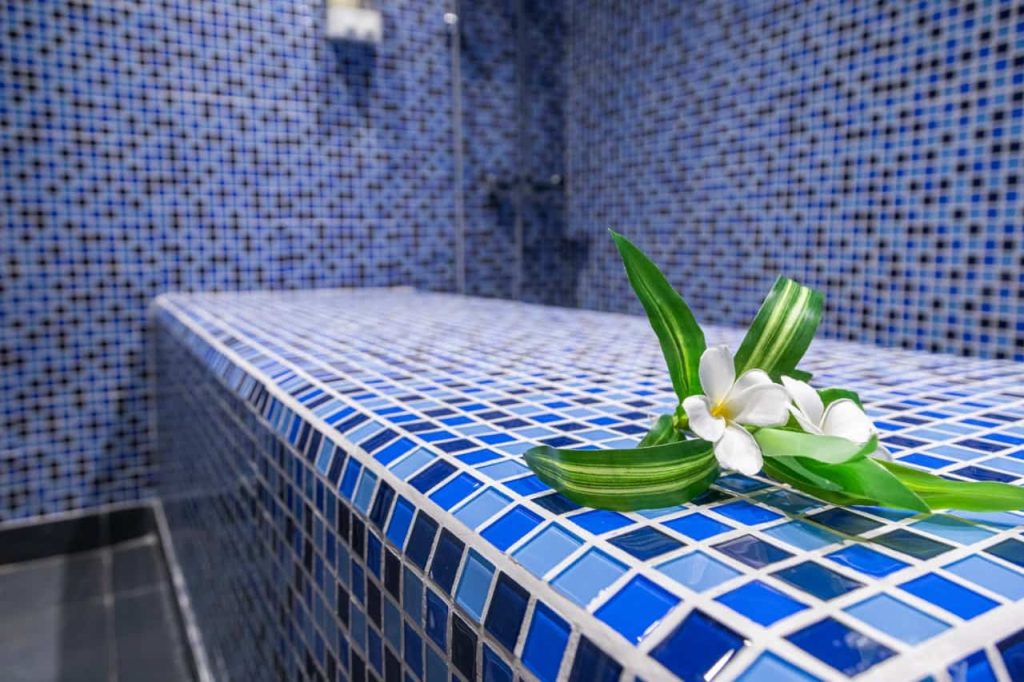Dubai’s wellness scene is vast, but few experiences offer the depth and sensory richness of a Moroccan bathhouse. Known locally as “hammam maghribi,” this centuries-old ritual is more than a spa treatment. It’s a slow, purifying ceremony rooted in North African tradition, blending steam, exfoliation, and nourishing oils. In Dubai, where luxury and heritage often intertwine, Moroccan bathhouses are offered in both traditional and high-end formats. Whether tucked inside heritage-inspired spas or five-star hotels, these spaces invite you to pause, sweat, and reconnect. The experience is meditative, physical, and unmistakably soulful.
What to Expect from a Moroccan Bath Experience
The journey begins with a warm steam session that opens your pores and melts tension. You’re then coated in black olive soap, known as savon noir, rich in vitamin E and designed to soften the skin. A therapist uses a coarse kessa glove to exfoliate your entire body, removing dead skin and stimulating circulation. After exfoliation, ghassoul clay, infused with rose or orange blossom water, is often applied as a mask. Rinsing is followed by hydrating oils like argan or almond, which are massaged gently into your skin. Each step is precise, deliberate, and guided by generations of wellness wisdom.
Where These Hammam Experiences Are Offered in Dubai
You’ll find Moroccan bathhouses spread across Dubai, often within Arabian-style spas or hidden in upscale wellness centers. Areas like Jumeirah, Deira, and Al Barsha host longstanding hammams that cater to both locals and expats. These venues usually offer private bathing rooms, warm marble benches, and staff trained in traditional North African techniques. On the more luxurious side, hammams within hotel spas—especially in Downtown and Palm Jumeirah—integrate opulent surroundings, mood lighting, and upgraded rituals with rose quartz or gold-infused oils. Despite differences in setting, the core elements remain consistent: steam, scrub, and serenity.
Cultural Etiquette and What You Should Know Before You Go
Experiencing a Moroccan bath requires physical and cultural preparation. It’s common to wear minimal clothing—most venues provide disposable undergarments or towels. The environment is often gender-specific, and some traditional hammams operate women-only or men-only hours. Modesty and relaxation go hand in hand, and it’s customary to maintain quiet during your session. Personal grooming is expected beforehand, and you may be asked to avoid heavy lotions or fragrances. Therapists are typically professionals trained in wellness hygiene standards, and venues in Dubai follow UAE regulations regarding spa safety, water quality, and personal care.
The Benefits Extend Far Beyond Skin Care
While the Moroccan bath leaves your skin noticeably smooth, its benefits reach deeper. The process boosts circulation, relieves muscle tension, and supports lymphatic drainage. Many guests report better sleep, reduced stress, and improved mood afterward. The rhythmic movements, the enveloping heat, and the natural ingredients all work together to reset your body. For residents navigating Dubai’s busy rhythm, hammam sessions offer a rare chance to fully unwind. Whether you’re recovering from travel, dealing with dry desert skin, or simply seeking a sensory reset, this ritual offers immediate and lasting renewal.

Differences Between Traditional Hammams and Hotel Spa Versions
Traditional Moroccan bathhouses in Dubai focus on authenticity and simplicity. These venues often use handmade kessa mitts, natural soaps, and locally sourced oils. They prioritize technique and cultural heritage over ambiance. By contrast, luxury hammams inside resort spas elevate the experience with aromatherapy, heated slabs, private shower suites, and optional upgrades like rose petal scrubs or caviar masks. Some even offer dual treatments for couples or incorporate reflexology post-scrub. Both options provide value—it simply depends on whether you’re seeking earthy tradition or indulgent refinement.
Booking and Timing Tips for First-Timers
Most Moroccan bathhouses in Dubai operate by appointment, though walk-ins are sometimes accepted in neighborhood spas. Early booking is advised, especially on weekends. Sessions typically last between 45 minutes to 90 minutes, depending on the package. Mornings are quieter and better for those seeking privacy. Avoid scheduling other strenuous activities afterward—your body may feel deeply relaxed or mildly detoxed. It’s also recommended to hydrate well before and after. Some venues offer hammam packages combined with massages or facials, which can be a worthwhile way to spend a full wellness day.
Venues That Locals Recommend for Authentic Hammam Rituals
While hotel spas receive the most publicity, many long-time Dubai residents prefer smaller, locally operated hammams that feel more grounded. Spas in Satwa, Karama, and Oud Metha often carry strong reputations for skilled therapists and consistent service. These venues may lack the marble columns and incense of luxury resorts, but they make up for it with heartfelt technique. Word of mouth, community groups, and personal recommendations are often the best ways to discover these gems. Once you find a good hammam, it often becomes part of your monthly wellness rhythm.
How the Ritual Reflects Broader Wellness Traditions in the UAE
Though the Moroccan bath isn’t native to the Emirates, it aligns beautifully with the regional emphasis on purification and hospitality. Much like the Emirati tradition of offering rose water or preparing the majlis for guests, the hammam embodies intentional care. It reflects a cultural appreciation for slowing down, for cleansing the body as a way of calming the spirit. In many ways, the popularity of Moroccan bathhouses in Dubai reflects a deeper yearning for balance—a reminder that in a city built on speed, stillness is its own kind of luxury.
Why These Experiences Stay with You Long After the Steam Fades
According to the www.few.ae team, “The Moroccan hammam isn’t just about cleaning the skin—it’s about clearing space within.” After the heat, the scrub, and the scented oils, what’s left is not just a soft exterior but a calmer inner world. Whether you experience it once during a visit or return regularly as part of your routine, a Moroccan bathhouse session in Dubai becomes a memory tied to care, ritual, and release.
In Dubai, the Moroccan bath is more than a spa ritual—it’s a tradition that softens the skin, restores the breath, and invites your spirit to slow down.
